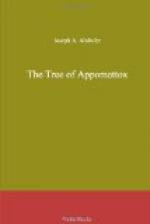“Truly, truly, John! Sit down! It’s the hospitality of your own general that you share when you join us. General Lee would never make terms with men like McClellan, Burnside and Hooker. No, sir, he preferred to defeat them, much as it cost our Union in blood and treasure, but with a man of genius like General Grant he could agree. Really great souls always recognize one another. Is it not so, John?”
“Beyond a doubt, Leonidas. We fully admit the greatness and lofty character of General Lee, as you admit the greatness and humanity of General Grant. One nation is proud to have produced two such men.”
“I agree with you, John. All of us agree with you. The soldiers of General Lee’s army who are here today will never dispute what you say. Now fall on, and join us at this board which, though rustic, is indeed a most luxurious and festive one. As I remember at West Point, you were a first-class trencherman.”
“And I am yet,” said John Carrington, as he took his share. They were joined a little later by a gallant young Southern colonel, Philip Sherburne, who had led in many a cavalry attack, and then the equally gallant Northern colonel, Alan Hertford, came also, and as everybody was introduced to everybody else the good feeling grew. At last the hunger that had been increasing so long was satisfied, and as they leaned back, Lieutenant Colonel St. Hilaire turned to Julien de Langeais:
“Julien,” he said, “take out your violin. There is no more fitting time than this to play. Julien, John, is a young relative of mine from Louisiana who has a gift. He is a great musician who is going to become much greater. Perhaps it was wrong to let a lad of his genius enter this war, but at any rate he has survived it, and now he will show us what he can do.”
De Langeais, after modest deprecations, took out his violin and played. Upon his sensitive soul the war had made such a deep impression that his spirit spoke through his instrument. He had never before played so well. His strings sang of the march, the camp, of victory and defeat, and defeat and victory, and as he played he became absorbed in his music. The people around him, although they were rapidly increasing in numbers, were not visible to him. Yet he played upon their hearts. There was not one among them who did not see visions and dream dreams as he listened. At last his bow turned into the old and ever young, “Home Sweet Home.”
’Mid pleasures and palaces
though we may roam,
Be it ever so humble, there’s
no place like home.
An exile from home, splendor
dazzles in vain,
Oh! give me my lowly, thatched
cottage again.
Into the song he poured all his skill and all his heart, and as he played he saw the house in which he was born on the far Louisiana plantation. And those who listened saw also, in spirit, the homes which many of them had not seen in fact for four years. Stern souls were softened, and water rose to eyes which had looked fearlessly and so often upon the charging bayonets of the foe.




